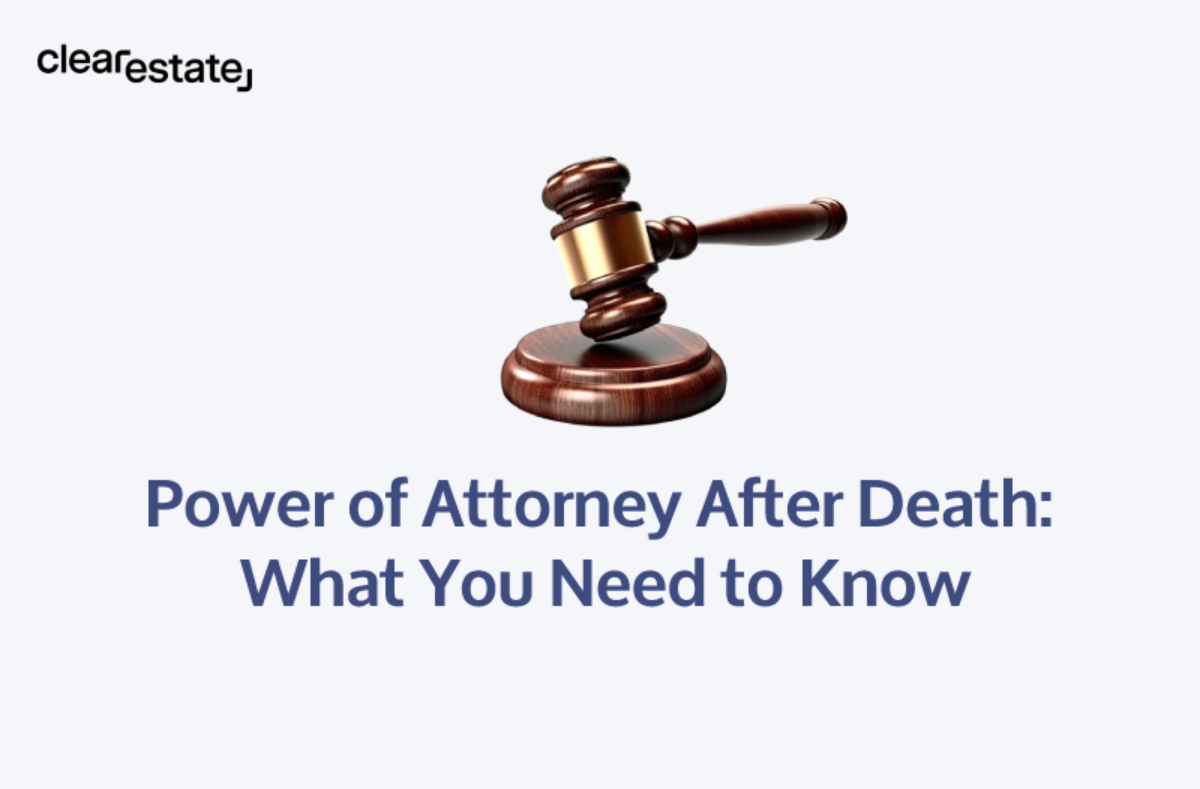Estate Settlement
May 01, 2025
What to Do When Someone Dies in California
Follow this step-by-step guide to navigate legal duties, probate, and estate tasks with clarity and confidence.
What happens to a power of attorney after the principal's death? Learn about the process and legal considerations in our detailed guide.


A power of attorney is a legal provision that empowers one individual to act on behalf of another, which is a critical estate planning document in the unfortunate case where the principal does not have the capacity to act.
But what becomes of the Power of Attorney when the principal passes away?
A power of attorney, also referred to as a letter of attorney, is a formal document that gives someone the permission to take actions or make decisions on your behalf. This could relate to personal matters, business transactions, or legal situations.
The individual who grants this authority is known as the principal or donor.
In simpler terms: it's like assigning a trusted stand-in who can make crucial decisions for you when you're unable to be present or act.
| Type of Power of Attorney | What It Does |
|---|---|
| Durable Power of Attorney | The durable power of attorney remains in effect when the principal has become mentally incapacitated. Ends when you pass away or if you choose to end it. |
| Non-Durable Power of Attorney | Only active until you can't make decisions for yourself. Often used for specific tasks or time periods. |
| Springing Power of Attorney | Only becomes active under certain conditions, usually if you can't make decisions for yourself. |
| General Power of Attorney | Gives someone else broad powers to act for you. Ends if you can't make decisions for yourself or when you pass away. |
| Financial Power of Attorney | Lets someone else handle your money matters. |
| Medical Power of Attorney | Lets someone else make healthcare decisions for you when you can't. |
A Power of Attorney (POA) ends after the death of the principal.
This legal authority is only valid during the lifetime of the person who issued it, becoming null and void once they pass away.
So in short - no a power of attorney is not valid after the death of the principal.
So, what happens next? This can be a bit tricky.
Before we can figure out who gets to make decisions on behalf of the deceased, we need to know if the deceased had left a will or not.
If they left a Will: The Executor's Roadmap
If there's a Will, the person or people named as the Executor(s) or Personal Representative(s) in the Will are in charge of making decisions.
But - to gain authority in administering the estate, the executor named in the will has to file a petition for probate.
The probate process can be a bit different in each state, but generally, the executor will need to provide documents like the death certificate, the will, and proof of their own identity to the closest county court in which the deceased passed away in.
If the will is proved and validated through the eyes of the law, the court will issue the executor a letter of testamentary. The letter of testamentary is a legal document that provides the estate administrator with the authority to administer the estate.
After obtaining a letter of testamentary from the court - the executor will be in charge of wrapping up the deceaseds affairs, this includes; notifying beneficiaries, notifying and paying creditors, selling assets, filing the final tax return, etc.
If they didn't leave a Will: Settlement by Intestate Laws
If there's no Will, then the person's property usually goes to the next of kin as defined by the laws of the state where the person lived (these are called “intestacy” laws).
But, the estate still needs to be officially opened by the probate court and an “Administrator” needs to be appointed. This is like an Executor, but for when there's no Will. The Administrator is usually the closest living relative, but it can vary from state to state.
The first person in line who's willing to do the job applies to the court to be appointed as Administrator. The court then gives them the responsibility to settle the estate, which is similar to what an Executor does.
Sometimes, they also need to get a bond as part of their appointment. Usually, a family member is appointed, but if no one steps up and the person who died owed money, a creditor might apply to be the Administrator to settle the debts.
In both cases, whether there's a Will or not, the property of the deceased goes through the probate process. The main difference lies in who makes the decisions and how the property is distributed. With a Will, the deceased has outlined their wishes. Without a Will, the state's laws guide the process. In either scenario, transparency and acting in everyone's best interest are crucial.
The power of attorney plays a vital role in managing an individual's affairs but ceases to exist after death, leaving decision-making to either the Executor, as named in a Will, or an Administrator in the absence of one.
Navigating the complexities of probate, whether dealing with a Will or intestate laws, requires understanding the respective responsibilities and legalities.
We understand how overwhelming the probate process can be, if you're settling an estate of a loved one - and you're in need of some guidance, book a free consultation with our estate professionals today and let us guide you through the probate process.
 Simplify Probate Today
Simplify Probate Today
Get expert guidance from our specialists who've helped 10,000+ families.
Book a free consultation